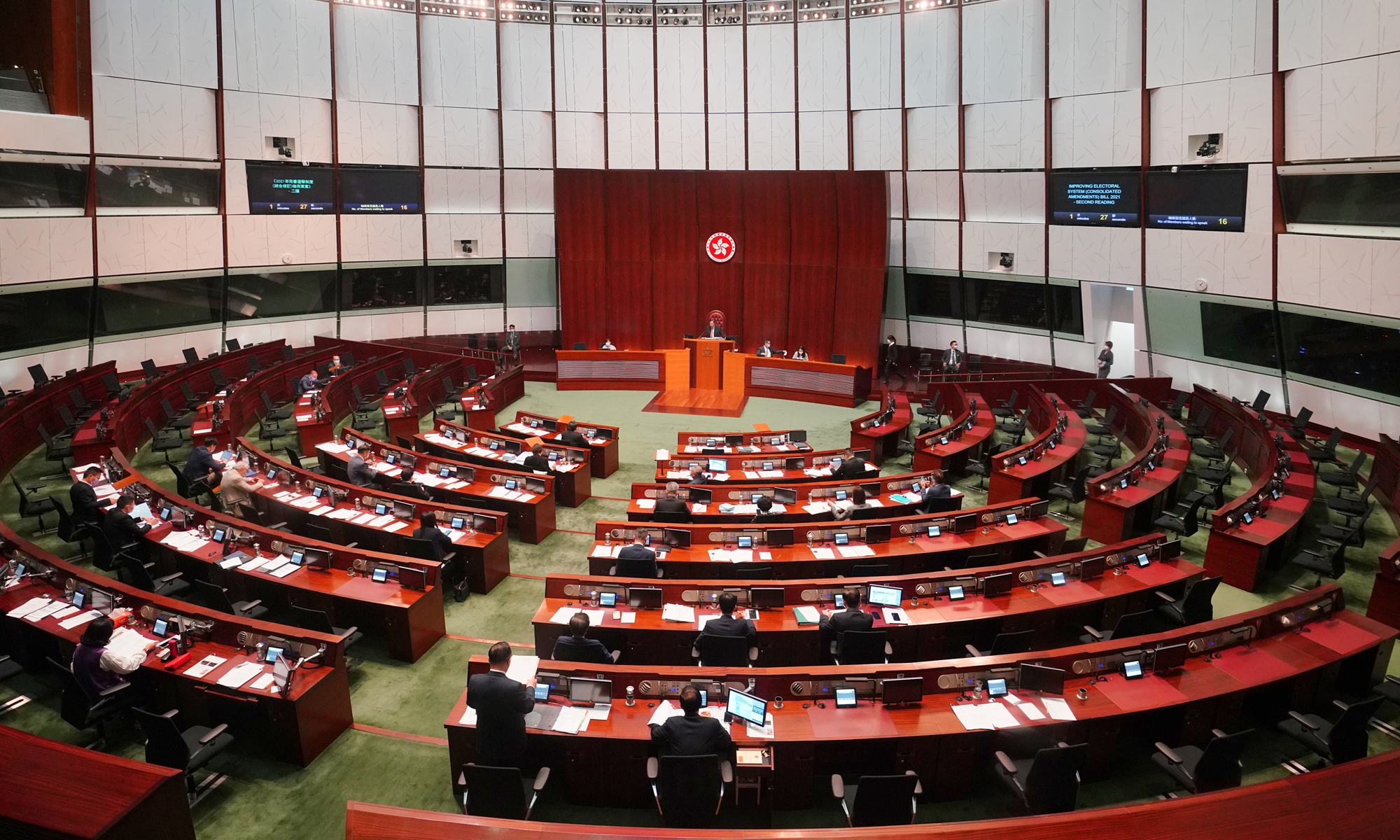
Legislative Council of Hong Kong (LegCo) Photo: VCG
The closely watched Hong Kong Legislative Council (LegCo) election on Sunday is raising high hopes for social and economic development in the Hong Kong Special Administrative Region (HKSAR), as the new LegCo is expected to avoid chaos and disruptions and focus on industrial policies and further integration with the Chinese mainland, LegCo candidates told the Global Times.
The election on Sunday is the first after electoral reforms implemented earlier this year to ensure that patriots, not secessionists, govern the HKSAR, which would help end political disruptions at the LegCo over the years and improve the body's efficiency in addressing various issues related to the livelihood of residents, analysts noted.
It is expected that the new LegCo will be characterized by broad representation, political inclusiveness, balanced participation, fairness and competitiveness, Andrew Leung Kwan-yue, president of the Sixth LegCo and a candidate for the new LegCo, told the Global Times in an email.
Among his proposals, Leung said, the first is to support "patriots governing Hong Kong" and promote good governance to create a favorable environment for industries.
"Hong Kong must formulate a sound industrial policy. Apart from supporting small businesses, we should promote the development of local advanced industries, help Hong Kong businesses expand their presence in the Greater Bay Area, and explore opportunities under the Belt and Road Initiative," Leung said.
This year's election marks the first LegCo election since the National Security Law for Hong Kong and electoral reform took effect.
In May, lawmakers in Hong Kong finalized amendments for the election overhaul, which increased the number of seats in the LegCo from 70 to 90 - 40 from the Election Committee, 30 from functional constituencies, and 20 that are directly elected.
Many candidates from Chinese mainland enterprises are running this year.
Mainland-funded enterprises are an important part of the local economy, Leung said, noting that there are mainland-backed companies in almost all industries in Hong Kong today, which is increasingly important to the Hong Kong economy.
According to Leung, there are more than 4,200 mainland companies operating in Hong Kong with cumulative assets of more than HK$11 trillion ($1.41 trillion). Among this group, 40 have assets of more than hundreds of billions of Hong Kong dollars, with more than 80,000 employees in Hong Kong. More than 1,100 mainland enterprises are listed in Hong Kong, accounting for half of the blue-chip stocks and two-thirds of the total market value.
For the future development of the city, Leung noted, Hong Kong should be fully integrated into the development of the Guangdong-Hong Kong-Macao Greater Bay Area (GBA) and use Hong Kong's positioning as an international innovation hub of the GBA to promote advanced industries in Hong Kong, with an emphasis on the development of value-added manufacturing.
The HKSAR government should formulate a broad vision and strategy to define the city's reindustrialization strategy - Industry 4.0 - and include microelectronics manufacturing, research and development for the manufacturing of traditional Chinese medicines, food processing and recycling in the blueprint, Leung said, suggesting that Hong Kong should seize the opportunity of the Belt and Road Initiative (BRI) to develop overseas markets.
A vital entrepot for trade between the Chinese mainland and the world, the city has long played an import role in intermediary trading.
In the first 11 months, trade between the HKSAR and the Chinese mainland exceeded 2 trillion yuan, according to customs data. Trade between Shenzhen and Hong Kong hit 634 billion yuan, accounting for 30 percent of total trade. That amount has already exceeded that of last year.
Li Chi Fung Michael, vice honorary secretary of the Hong Kong Chinese Importers' & Exporters' Association, a candidate for the LegCo, stressed that the HKSAR government should further enhance communication among firms in the Chinese mainland and Hong Kong to boost cooperation.
"For example, Hong Kong companies can initiate and sign deals with foreign enterprises, while authorize the production for companies in the Chinese mainland, which can take the scientific advantages in Shenzhen and the production advantages in Dongguan, South China's Guangdong Province," Li told the Global Times on Friday.
Li runs a business that focuses on importing and exporting canned goods, which was hit by riots earlier in the city and then the COVID-19 pandemic.
"The confidence of the import and export industry has been gradually restored after the implementation of the Hong Kong National Security Law," Li said, adding that businesses have basically recovered and some small companies have even expanded.




